Title search results
Showing 1 - 5 of 5 items
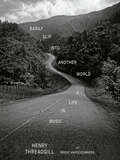
Easily slip into another world: A life in music
By Henry Threadgill. 2023
An autobiography of one of the towering figures of contemporary American music and a powerful meditation on history, race, capitalism,…
and art. Henry Threadgill has had a singular life in music. At 79, the saxophonist, flautist, and celebrated composer is one of three jazz artists (along with Ornette Coleman and Wynton Marsalis) to have won a Pulitzer Prize. In Easily Slip into Another World , Threadgill recalls his childhood and upbringing in Chicago, his family life and education, and his brilliant career in music. Here are riveting recollections of the music scene in Chicago in the early 1960s, when Threadgill developed his craft among friends and schoolmates who would go on to form the core of the highly influential Association for the Advancement of Creative Musicians (AACM); the year and a half he spent touring with an evangelical preacher in the mid-1960s; his military service in Vietnam—a riveting tale in itself, but also representative of an under-recognized aspect of jazz history, given the number of musicians in Threadgill’s generation who served in the armed forces. We appreciate his genius as he travels to the Netherlands, Venezuela, Trinidad, Sicily, and Goa enriching his art; immerses himself in the volatile downtown scene in New York City in the 1970s and 1980s; collaborates with choreographers, writers, and theater directors as well as an astonishing range of musicians, from AACM stalwarts (Muhal Richard Abrams, Roscoe Mitchell, Wadada Leo Smith, and Leroy Jenkins), to Chicago bluesmen, downtown luminaries, and world music innovators; shares his impressions of the recording industry his perspectives on music education and the history of Black music in the United States; and, of course, accounts for his work with the various ensembles he has directed over the past five decades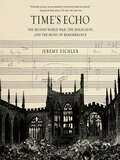
Time's echo: The second world war, the holocaust, and the music of remembrance
By Jeremy Eichler. 2023
A stirring account of how music bears witness to history and carries forward the memory of the wartime past In…
1785, when the great German poet Friedrich Schiller penned his immortal "Ode to Joy," he crystallized the deepest hopes and dreams of the European Enlightenment for a new era of peace and freedom, a time when millions would be embraced as equals. Beethoven’s Ninth Symphony then gave wing to Schiller’s words, but barely a century later these same words were claimed by Nazi propagandists and twisted by a barbarism so complete that it ruptured, as one philosopher put it, "the deep layer of solidarity among all who wear a human face." When it comes to how societies remember these increasingly distant dreams and catastrophes, we often think of history books, archives, documentaries, or memorials carved from stone. But in Time’s Echo, the award-winning critic and cultural historian Jeremy Eichler makes a passionate and revelatory case for the power of music as culture’s memory, an art form uniquely capable of carrying forward meaning from the past. With a critic’s ear, a scholar’s erudition, and a novelist’s eye for detail, Eichler shows how four towering composers—Richard Strauss, Arnold Schoenberg, Dmitri Shostakovich, and Benjamin Britten—lived through the era of the Second World War and the Holocaust and later transformed their experiences into deeply moving, transcendent works of music, scores that echo lost time. Summoning the supporting testimony of writers, poets, philosophers, musicians, and everyday citizens, Eichler reveals how the essence of an entire epoch has been inscribed in these sounds and stories. Along the way, he visits key locations central to the music’s creation, from the ruins of Coventry Cathedral to the site of the Babi Yar ravine in Kyiv. As the living memory of the Second World War fades, Time’s Echo proposes new ways of listening to history, and learning to hear between its notes the resonances of what another era has written, heard, dreamed, hoped, and mourned. A lyrical narrative full of insight and compassion, this book deepens how we think about the legacies of war, the presence of the past, and the renewed promise of art for our lives today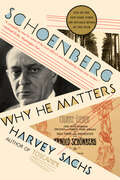
Schoenberg: Why He Matters
By Harvey Sachs. 2023
An astonishingly lyrical biography that rescues Schoenberg from notoriety, restoring him to his rightful place in the pantheon of twentieth-century…
composers. In his time, the Austrian American composer Arnold Schoenberg (1874–1951) was an international icon. His twelve-tone system was considered the future of music itself. Today, however, leading orchestras rarely play his works, and his name is met with apathy, if not antipathy. With this interpretative account, the acclaimed biographer of Toscanini finally restores Schoenberg to his rightful place in the canon, revealing him as one of the twentieth century’s most influential composers and teachers. Sachs shows how Schoenberg, a thorny character who composed thorny works, raged against the “Procrustean bed” of tradition. Defying his critics—among them the Nazis, who described his music as “degenerate”—he constantly battled the anti-Semitism that eventually precipitated his flight from Europe to Los Angeles. Yet Schoenberg, synthesizing Wagnerian excess with Brahmsian restraint, created a shock wave that never quite subsided, and, as Sachs powerfully argues, his compositions must be confronted by anyone interested in the past, present, or future of Western music.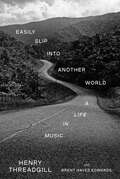
Easily Slip into Another World: A Life in Music
By Henry Threadgill, Brent Hayes Edwards. 2023
An autobiography of one of the towering figures of contemporary American music and a powerful meditation on history, race, capitalism,…
and art.Henry Threadgill has had a singular life in music. At 79, the saxophonist, flautist, and celebrated composer is one of three jazz artists (along with Ornette Coleman and Wynton Marsalis) to have won a Pulitzer Prize. In Easily Slip into Another World, Threadgill recalls his childhood and upbringing in Chicago, his family life and education, and his brilliant career in music.Here are riveting recollections of the music scene in Chicago in the early 1960s, when Threadgill developed his craft among friends and schoolmates who would go on to form the core of the highly influential Association for the Advancement of Creative Musicians (AACM); the year and a half he spent touring with an evangelical preacher in the mid-1960s; his military service in Vietnam—a riveting tale in itself, but also representative of an under-recognized aspect of jazz history, given the number of musicians in Threadgill&’s generation who served in the armed forces.We appreciate his genius as he travels to the Netherlands, Venezuela, Trinidad, Sicily, and Goa enriching his art; immerses himself in the volatile downtown scene in New York City in the 1970s and 1980s; collaborates with choreographers, writers, and theater directors as well as an astonishing range of musicians, from AACM stalwarts (Muhal Richard Abrams, Roscoe Mitchell, Wadada Leo Smith, and Leroy Jenkins), to Chicago bluesmen, downtown luminaries, and world music innovators; shares his impressions of the recording industry his perspectives on music education and the history of Black music in the United States; and, of course, accounts for his work with the various ensembles he has directed over the past five decades.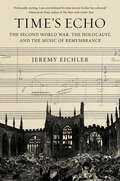
Time's Echo: The Second World War, the Holocaust, and the Music of Remembrance
By Jeremy Eichler. 2023
A stirring account of how music bears witness to history and carries forward the memory of the wartime pastIn 1785,…
when the great German poet Friedrich Schiller penned his immortal &“Ode to Joy,&” he crystallized the deepest hopes and dreams of the European Enlightenment for a new era of peace and freedom, a time when millions would be embraced as equals. Beethoven&’s Ninth Symphony then gave wing to Schiller&’s words, but barely a century later these same words were claimed by Nazi propagandists and twisted by a barbarism so complete that it ruptured, as one philosopher put it, &“the deep layer of solidarity among all who wear a human face.&”When it comes to how societies remember these increasingly distant dreams and catastrophes, we often think of history books, archives, documentaries, or memorials carved from stone. But in Time&’s Echo, the award-winning critic and cultural historian Jeremy Eichler makes a passionate and revelatory case for the power of music as culture&’s memory, an art form uniquely capable of carrying forward meaning from the past.With a critic&’s ear, a scholar&’s erudition, and a novelist&’s eye for detail, Eichler shows how four towering composers—Richard Strauss, Arnold Schoenberg, Dmitri Shostakovich, and Benjamin Britten—lived through the era of the Second World War and the Holocaust and later transformed their experiences into deeply moving, transcendent works of music, scores that echo lost time. Summoning the supporting testimony of writers, poets, philosophers, musicians, and everyday citizens, Eichler reveals how the essence of an entire epoch has been inscribed in these sounds and stories. Along the way, he visits key locations central to the music&’s creation, from the ruins of Coventry Cathedral to the site of the Babi Yar ravine in Kyiv. As the living memory of the Second World War fades, Time&’s Echo proposes new ways of listening to history, and learning to hear between its notes the resonances of what another era has written, heard, dreamed, hoped, and mourned. A lyrical narrative full of insight and compassion, this book deepens how we think about the legacies of war, the presence of the past, and the renewed promise of art for our lives today.